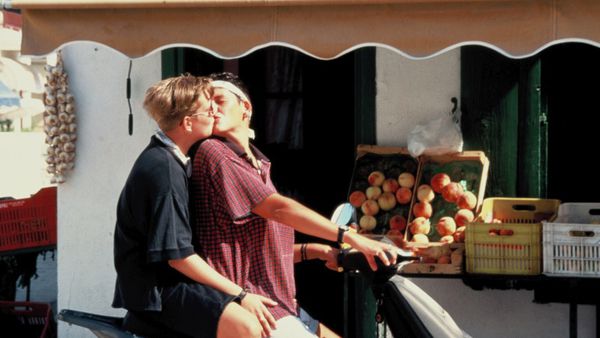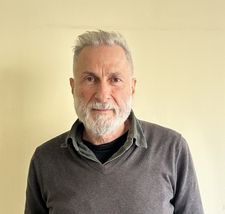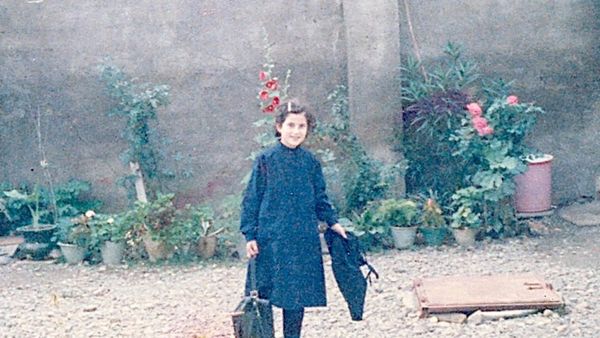 |
| Lesvia Photo: Courtesy of Thessaloniki International Documentary Film Festival |
The personal and the political stood front and centre at Thessaloniki International Documentary Festival during its 26th edition.
Earlier this year Greece became the first Christian-Orthodox country to legalise same-sex marriage and the festival celebrated LGBQT+ cinema with tribute Citizen Queer. The showcase featured more than 25 films and there was also a strong LGBQT+ showing across the festival’s other sections.
It was all the more appalling then, when a transgender couple were attacked by a mob of young thugs near the Olympion Cinema in Aristotelous Square on the festival’s first weekend, leading to more than 20 arrests. That, in turn, led to thousands protesting in the same square the next night to speak out against homophobia, transphobia and fascism.
The turbulent week continued as riot police were deployed on Tuesday night after the poster for Elina Psykou’s Stray Bodies sparked controversy. The Greek filmmaker, whose debut documentary took on the hot button issues of women crossing borders in Europe to seek abortion, IVF treatment and assisted suicide led to a backlash because of a poster depicting a bare-breasted pregnant woman on a crucifix.
The Greek Orthodox Metropolitan of the city, Philotheos, described the poster as “deeply provocative to the religious sentiment of the Christians of our city”. However, the film’s screenings passed off without incident.
 |
| Panayotis Evangelidis: 'Reality calls for us to take a stand before evil knocks on our own door' Photo: Courtesy of Thessaloniki International Documentary Film Festival |
Filmmakers also expressed their solidarity throughout the week. Greek filmmaker Panayotis Evangelidis - whose work puts issues of the visibility of the LGBTQI+ community in the spotlight - accepted a career Golden Alexander this week and welcomed the progress made by Greece while, in response to the transphobic attack, noting “reality calls for us to take a stand before evil knocks on our own door”.
It is the personal that comes to the fore in Tzeli Hadjidimitriou’s Lesvia, which considers her own experiences of affirming her lesbian identity on the island of Lesbos alongside the lesbian community that grew there from the Seventies onwards. She displays a light touch with her debut feature as she explores the joys offered by the community that sprang up, filled as much with feminism as with newly founded relationships, as well as charting its sometimes difficult relationship with the locals and the way things have changed down the years.
Also coming at a wider issue from a personal angle was My Stolen Planet, which saw Farahnaz Sharifi consider the resistance to the Iranian regime that happens away from the eyes of the authorities. Awarding it the Golden Alexander, the jury noted that it “brilliantly confirms that every political reality has a subreality and that resistance comes in many forms, not least among them in the private realm”.
Meanwhile Lidia Duda's Silver Alexander-winnning Forest brings an unusual angle to the subject of refugees on the Polish-Belarus border, showing the impact the situation has on a single family and, in particular, offers a child’s eye view. The jury noted “the film shows the protagonists matter of factly rising to the occasion, thereby affirming the power of simple humanity”.
 |
| My Stolen Planet |
On a smaller scale, Polina Moshenska’s affecting and heartfelt short film Re-creations also brings home the high price of the Russian invasion. Her film, shot in Scotland with an eye for strong imagery, charts the difficulties faced by herself and two of her friends, which emerge from both the displacement and the liminal world that many find themselves in with no prospect of being able to return to the home they once knew.
Also focused on a home that must be abandoned is Matthäus Wörle’s Where We Used To Sleep. His carefully crafted observational film follows elderly Romanian Valeria as she goes about her life with her beloved cow Păuna and boisterous dog Duracell even as she knows she will have to leave as a flood from a nearby copper mine gradually creeps closer to her door. Wörle puts Ceaucescu-era propaganda film to good use in contrast to the quotidian goings on in Valeria’s small but much-loved world. A film built on intimacy and understanding.
Elsewhere among the competition sections, Glass, My Unfulfilled Life took home the Best Newcomer award, about a Dutchman aiming to succeed as a street musician. I didn’t manage to catch it but it certainly went down a storm with the jury, who wrote: “A simple story that resonates at a human level, exploring universal topics such as the courage and resilience required to pursue one's dream and make a film about it with the same relentless commitment. With its blend of humour, self-irony and a little bit of drama it explores the theme of autofiction with honesty and vulnerability. With this award we would like to encourage the director to find another big and crazy dream so he could make another good film, maybe…”
And in the Film Forward section, Lola Arias’ inventive musical/documentary hybrid Reas, about the past lives and future hopes of a group of prisoner’s in a women’s jail took home the top prize.
If there’s one thing Thessaloniki International Documentary Film Festival continues to prove it’s that strength lies in a broadness of debate, not a narrowing of it. As a port city it seems highly appropriate that it remains a welcoming berth for stories big and small from across the globe that often carry cargo that finds surprising resonance with films from elsewhere as well as its enthusiastic audiences.
The full list of awards is below:
International Competition Awards
- Golden Alexander: My Stolen Planet by Farahnaz Sharifi
- Silver Alexander: Forest by Lidia Duda
- Jury Special Mention: Stray Bodies by Elina Psykou
Newcomers Competition Awards
- Golden Alexander Dimitri Eipides Award: Glass, My Unfulfilled Life by Rogier Kappers
- Silver Alexander: Fighting Demons With Dragons by Camilla Magid
- Jury Special Mention: Tack by Vania Turner
Film Forward Competition Awards
- Golden Alexander: Reas by Lola Arias
- Silver Alexander: Desire Lines by Jules Rosskam
- Jury Special Mention: Avant-Drag! by Fil Ieropoulos
Fipresci Awards
- Best Documentary in the International Program: My Stolen Planet by Farahnaz Sharifi
- Best Greek Documentary in the Official Selection: Tack by Vania Turner





















